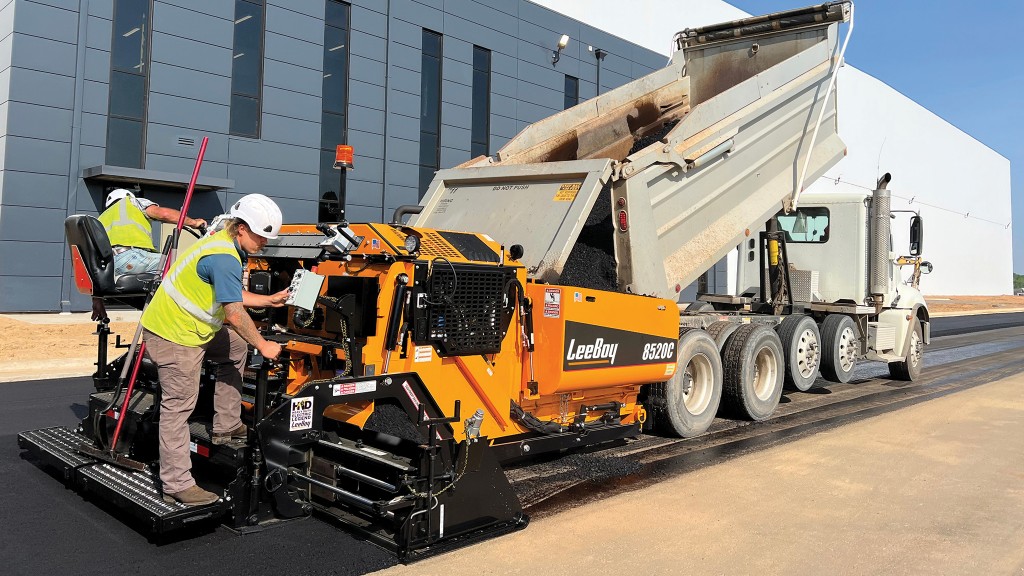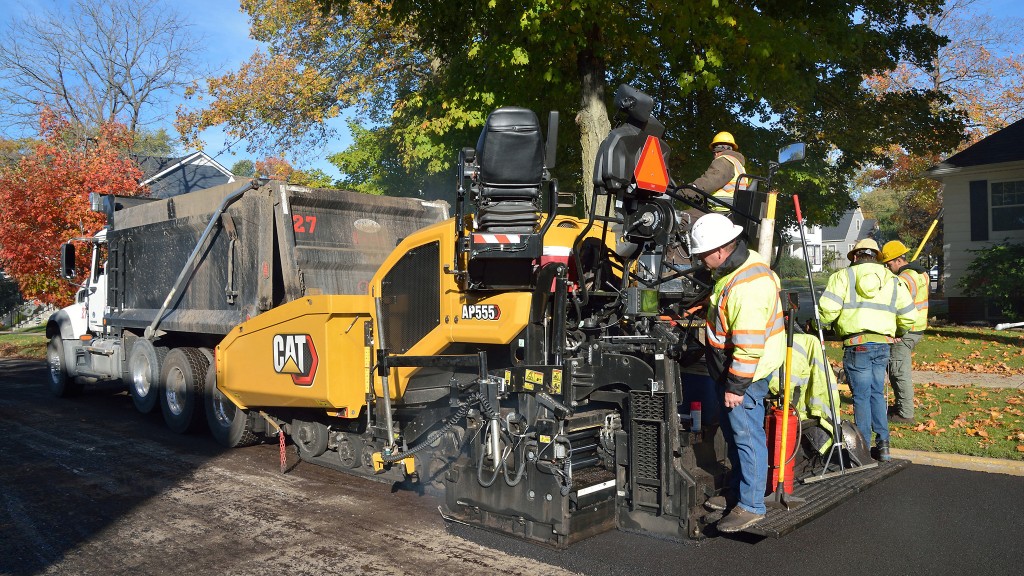How to prevent asphalt buildup in compact pavers
Asphalt collecting in and on pavers can cause problems – keeping them clean is an all day task

Asphalt pavers move tons of material through many moving parts to lay down smooth mats of all sizes. Not all of that asphalt makes it into the mat, though – material can become caught in various places and must be cleared before it hardens.
Smaller pavers, which may perform multiple jobs through the day, are at risk of asphalt buildup in the system, causing excess wear and unnecessary downtime. Preventing buildup damage is an all-day project, from startup to shutdown.
Buildup leads to breakdown of paver and paving quality
When asphalt collects unnoticed on the surfaces of an asphalt paver, problems start almost immediately. Effects can be seen both in the mechanical state of the machine as well as the quality of the mat it is laying, said Chris Broome, senior product manager with LeeBoy.
"The excess buildup is going to increase wear on your parts – anything that moves and anything that the asphalt contacts. So, you have excess wear and the binding of parts as that material hardens," Broome described.
When asphalt gets caught up in one spot, more material gathers there and starts to affect operation immediately. Buildup on the screed, for example, results in material not moving smoothly and causes issues with the mat.
Compact pavers can be especially challenging for asphalt buildup simply because of how they're used. A competitive labour market in paving makes it difficult to keep long-time employees on commercial crews, which can lead to training issues surrounding activities like cleanup. Pavers may be more likely to go without necessary cleaning, causing problems the next day.
Moving from job to job through the day, compared to highway-class pavers that usually work on one project long-term, can also lead to cleaning hiccups.
"Some of these guys are doing driveways, where you may do two or three in a day. So, you have buildup sitting there for a couple of hours between jobs that hardens up. They don't necessarily need to do a full cleanup between jobs, but they really need to take a minute or two and knock that material off," Broome said.
Start clean and stay clean
Protecting pavers against asphalt buildup needs to start when the paver is brand new and continue through the machine's working life. The first task with a new paver is to give it a good spray with a release agent approved for use by local authorities. These water-soluble agents provide a clean slate that helps prevent asphalt from adhering.
"With all that fresh paint and all those fresh surfaces, you want to do the best spray down before the first job. If you've got a wide conveyor paver, that includes lifting the deck," Broome said. "All areas that are going to come into contact need to be hit with the release agent before the first load of mix ever hits the machine. It's very critical."
Treating those surfaces is also key prior to starting work every day. Operators will usually notice certain spots that collect asphalt on their pavers and should spray them with release agent to start the day, Broome said.
During the day, crews should watch for certain situations that can contribute to buildup. Overfilling of the screed can push material over the top of the screed where it can harden, and backing into a pile may pick up asphalt that sticks to the back of the screed. Commercial crews often have ground workers who take shovels of material to fill around utilities or other obstacles, which can leave small spills that need to be cleaned up.
Spills should be cleaned up immediately while the asphalt is still hot. Crew members should knock it off if within reach and, if not, they should spray it with release agent so that it can be removed later.
Wrap up the day with a good cleaning
At the end of the day, it is essential to give pavers a good cleaning to prevent asphalt from hardening overnight. Broome advises to start with the conveyor, which has the most contact with asphalt through the day.
Run the machine, turn the conveyors, and spray each individual bar as it moves, especially on pavers with wide conveyors in which the bars move under the deck into the belly pans – this carries the release agent under the deck and helps keep material in that area from hardening fully. It's also a good idea to move the conveyor a half hour or so after the process to keep the bars from settling in any unseen material that may then cause resistance in the morning.
Knock excess material off both edges of the screed and spray them down, then run screed extensions out and check them for buildup as well, Broome advised.
Some areas that can be overlooked in the cleaning process and cause lingering issues include the wing hinges on either side of the hopper. The space behind the hinge is especially problematic; if asphalt builds up too much it can cause damage. Check the tracks and walk boards as well – they are frequently skipped.
Control material to reduce buildup
When it comes to protecting compact pavers from asphalt buildup, design can make a difference. To prevent buildup, LeeBoy has designed its pavers to keep the material moving smoothly through the machine.
LeeBoy uses a sonic sensor to manage the height of material in the extension, and automatic controls keep asphalt from overflowing. Overloading can get between and under the tracks, causing a variety of problems, so sensors that keep the pile height down make a difference.
Some LeeBoy machines also use wing wipers, which are found at the back of the wings where they meet the engine compartment. They protect against material escaping in that area.
"Use pavers with some additional controls that help you keep the material where it's supposed to be," Broome advised. "If you pull so much material that it's coming up and out the walk boards or toe board on the back of the paver, you're going to have a lot of problems."



